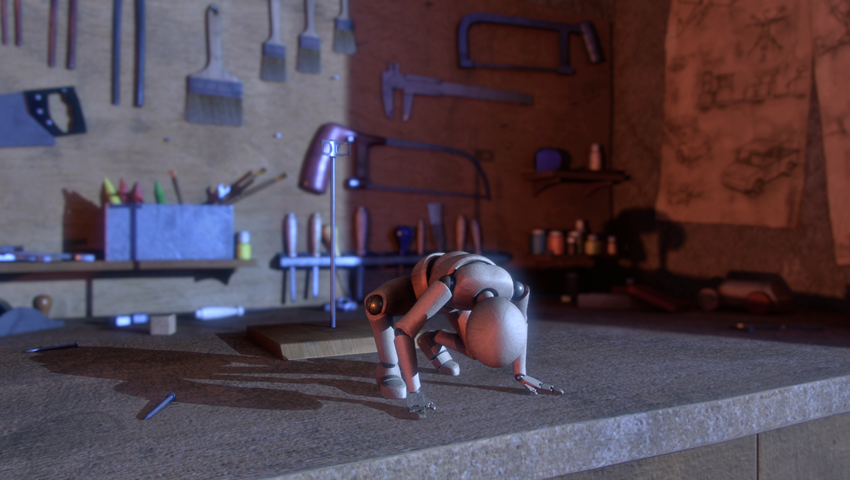Image from Now Way Out courtesy of Stuff 3D Animation
Historically, regions such as North America, Europe, Asia, and recently Australasia receive the majority of the work and funding on 3D animated feature film projects. Regions such as Latin America, on the other hand, receive very little visibility. Why is this happening, and what can be done to change it?
Latin American Talent
Some reasons for the limited number of 3D animated feature and short films produced in Latin America, when compared to other regions, are the difficult socio-economic situation and the lack of investment in computer graphics and 3D animation in these areas. However, when you observe the work that is being produced, it is apparent that these regions are full of great talent that is in need of support. This is the case of Venezuela and the animated short No Way Out, produced by the company Stuff3D Animation. [WATCH THE VIDEO]
Stuff3D Animation was created with the purpose of providing architectural visualization to the local industry. Unfortunately, the economic climate in Venezuela meant that many of these projects were underfunded and barely covered the cost of the resources and company overhead. Given this situation, the idea of creating an animated short was born partly to showcase the quality of the Stuff3D Animation’s work. By doing so, their portfolio would expand and include a showcase piece and subsequently build the company’s reputation.
The initial idea was the brainchild of Eduardo Roa, and artists Reinaldo Chacón and Adriana Carrera created the script of No Way Out. It tells the story of a puppet that comes to life, its dreams and how those dreams eventually come true. All of this transpires in 4 and a half minutes! No Way Out‘s creators and artists include: Eduardo Roa, Arquímedes Gonzáles, Reinaldo Chacón, Adriana Carrera, Carlos Gonzáles, Edgardo Bermúdez, Evelyn de León, Gabriela Chacón, José Bolívar, Daniel Moreno, Robert Méndez, Katherine Da Silva, Yanet Devis, Yessica De Ascençao, Jesús Querales, David Rubel and María Cecilia García.
It took a year and a half to finish No Way Out. It was 2013. The short was promoted and distributed using the team members’ social media channels, receiving great support from Venezuelan audiences. It was shown on the Baralt Theatre’s screen in Maracaibo and several festivals. Despite the lack of financial support and limited time the team members were able to work on the project (all members of the company had other full-time employment in addition to their jobs with Stuff3D), No Way Out exceeded the standards of previous shorts created in Venezuela.
Further evidence of the film’s success included several national awards in Venezuela including Best Animated Short and Best Original Music of Barquisimeto Short Film Festival 2013, and Best Animated Short in the ELCO Festival 2013. Despite the festival success and accolades, the film was not distributed internationally.
Lack of money or distribution
Receiving the awards in the national festivals was a huge achievement and meant a great deal to the group. However, this achievement did not bring the change that was expected by the creators.
When the director of the animated short film Eduardo Roa was asked what does it take for a country like Venezuela, or a region such as Latin America to have a vibrant animation industry, he answered:
“I believe that the creation of projects of this magnitude should be stimulated with some strategy between the governmental entities and the academies of computer graphics. The particular learning acquired with these kind of challenges is invaluable. In both cases, the development of 2D or 3D animated shorts, we should also try to promote competitions and specializations that deal with this subject in the universities. Also the publicity and incentive to carry out this type of work by the government, the academies, and private industry will increase the development of these type of projects.”
The Future …
The animated short film No Way Out demonstrated the amount of talent, energy and desire needed to overcome the obstacles in Venezuela and Latin America. The short film also demonstrated that it is essential to have the economic support of governments and private companies to promote local talent, and to increase the contribution of these regions to the global market for 3D animation.
Cuando te sientes Sin Salida, el arte te ofrece un camino a seguir.
A lo largo de la historia del cine y de la animación 3D hemos visto que son regiones como Norteamérica, Europa, Asia y recientemente Australasia las que generan constantes contribuciones taquilleras. Sin embargo, regiones como Latinoamérica no logran la visibilidad esperada. ¿Por qué ocurre esto, y qué se puede hacer para cambiarlo?
Talento Latinoamericano
Algunas de las causas de la reducida cantidad de trabajos en animación 3D producidos en Latinoamérica, en comparación con otras regiones, es la difícil situación socioeconómica de algunos países y la falta de inversión. Sin embargo, al observar en detalle las creaciones producidas en esta región, es indudable que el talento está presente y sólo necesita ser apoyado. Éste es el caso de Venezuela y del corto animado Sin Salida, producido por la empresa Stuff3D Animation.
Stuff3D Animation fue creado con el propósito de proporcionar apoyo en la visualización arquitectónica a la industria local. Desafortunadamente el clima económico en Venezuela significó que muchos de estos trabajos fueran realizados con honorarios mínimos que apenas lograban cubrir el costo de los recursos y gastos de la empresa. Ante esta situación, el equipo decidió crear crear un corto animado que mostrara la calidad del trabajo de Stuff 3D. Esto permitiría a la empresa expandir su portafolio elevando el prestigio de la compañía.
Fue así como Eduardo Roa, junto con los artistas Reinaldo Chacón y Adriana Carrera comenzaron a crear el guión del corto animado Sin Salida. Éste en 4 minutos y medio, narra la historia de un muñeco que adquiere vida, sus sueños y cómo estos logran hacerse realidad. El equipo de creadores y artistas estuvo conformado por: Eduardo Roa, Arquímedes Gonzáles, Reinaldo Chacón, Adriana Carrera, Carlos Gonzáles, Edgardo Bermúdez, Evelyn de León, Gabriela Chacón, José Bolívar, Daniel Moreno, Robert Méndez, Katherine Da Silva, Yanet Devis, Yessica De Ascençao, Jesús Querales, David Rubel y María Cecilia García.
El grupo se tomó año y medio para realizar Sin Salida. Al finalizar el cortometraje en el 2013, este fue publicado en las redes sociales recibiendo buenas críticas y apoyo del público venezolano. También fue proyectado en el Teatro Baralt en la ciudad de Maracaibo y en los festivales que éste participó. A pesar de la falta de apoyo financiero y el tiempo limitado para trabajar en el proyecto (todos los miembros de la compañía tenían otros empleos a tiempo completo además de sus trabajos con Stuff3D), Sin Salida superó los estándares de los trabajos producidos en Venezuela hasta ese momento.
Prueba de ello fueron los numerosos premios nacionales en Venezuela recibidos, incluyendo Mejor Corto Animado y Mejor Música Original en el Festival de Cortometrajes de Barquisimeto 2013, y Mejor Corto Animado en el Festival ELCO 2013. Sin embargo, el corto no fue distribuido internacionalmente.
¿Falta de dinero o difusión?
Recibir los premios en los festivales nacionales fue un gran logro y significó mucho para el equipo. No obstante, esto no trajo el cambio esperado para Stuff 3D Animation.
Cuando se le preguntó al director del Sin Salida, Eduardo Roa, qué se necesita para hacer de Venezuela y de toda la región una industria vibrante en computación gráfica y animación, éste contestó:
“Creo que debe estimularse la creación de proyectos de esta magnitud con alguna estrategia entre los entes gubernamentales y las academias de Computación Gráfica. Tanto en el caso del desarrollo de cortos animados 2D o 3D. También se debe tratar de impulsar en las universidades carreras y especializaciones que traten sobre este tema. Así como la publicidad y el incentivo a realizar este tipo de trabajos por parte del Gobierno, las academias y la industria privada.”
El futuro …
El cortometraje animado Sin Salida, demostró una vez más la cantidad de talento, energía y afán de superación en Venezuela y Latinoamérica. El corto también demostró que es fundamental tener el apoyo económico de los gobiernos y de la empresa privada para promover este talento, repercutiendo en el aumento de la contribución de estas regiones al mercado global de la animación 3D.



